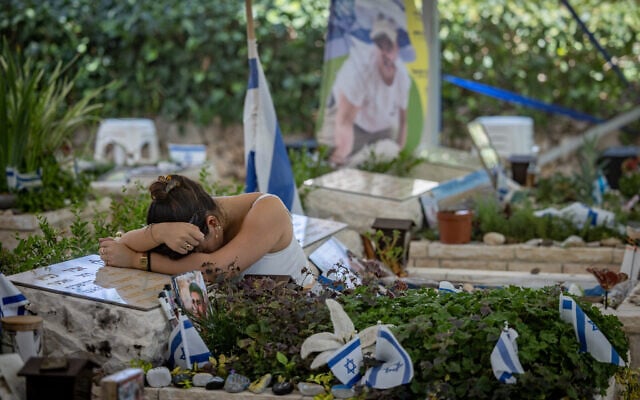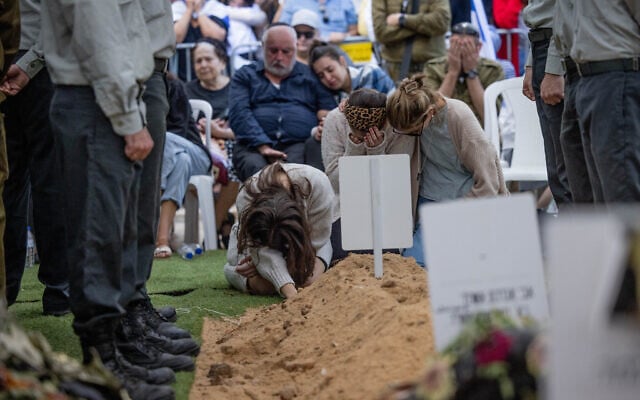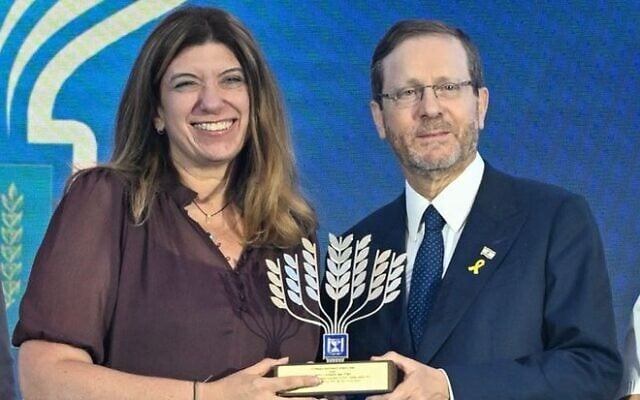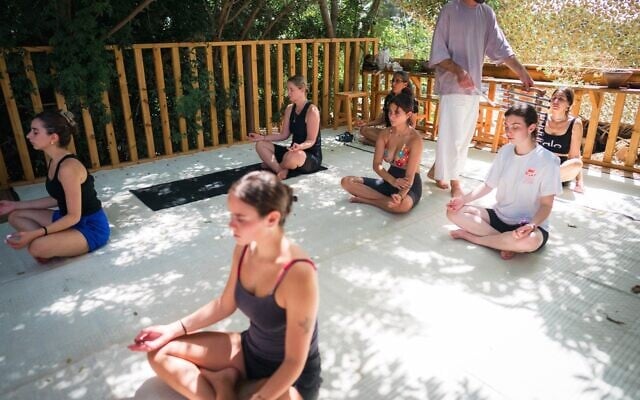

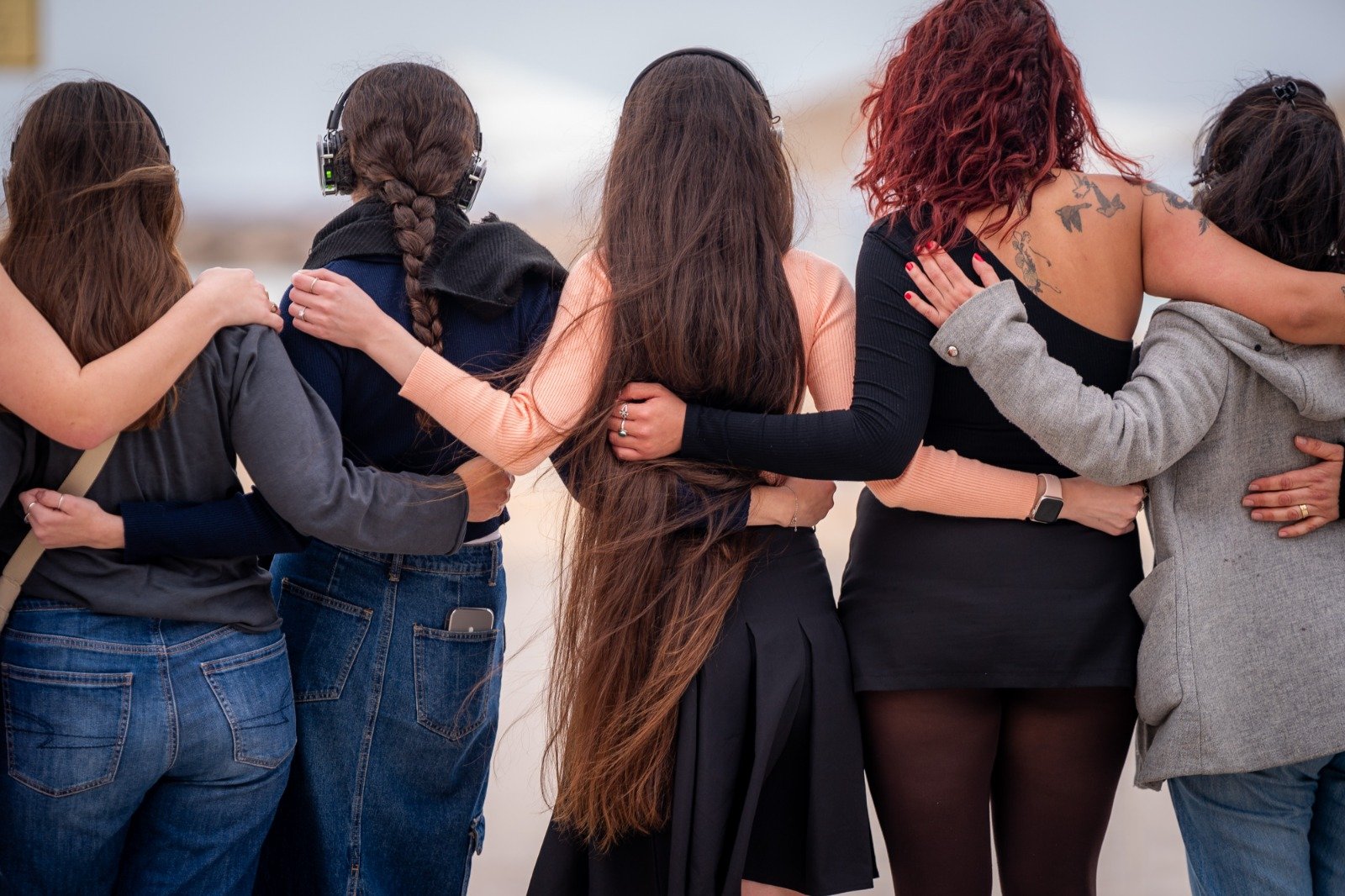
High school sweethearts Megan Kaye and Yair Avitan had always imagined a future together — traveling the world, celebrating milestones, and one day starting a family. But on June 28, 2024, that future was abruptly shattered.
Avitan, a 20-year-old combat soldier in the Paratroopers Brigade’s 890th Battalion, was on a mission in Gaza City’s Shejaiya neighborhood when he was killed in a firefight with Hamas operatives.
For Kaye, 20, who had shared more than three years together with Avitan, the loss was unbearable.
“A big dream of ours was to marry at the end of the war,” she said, recalling plans for a celebratory trip after Avitan completed his mandatory army service. “In one day, those dreams were crushed.”
“I lost myself,” Kaye added. “I didn’t know how to deal with it.”
Yet, even amid the depth of her grief, Kaye faced another painful reality: she was not eligible for governmental assistance because she and Avitan were unmarried at the time of his death.
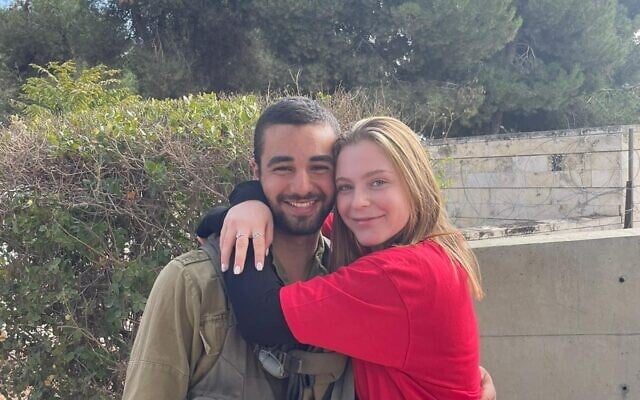
Since Hamas’s October 7, 2023, attacks on southern Israel ignited the ongoing war, nearly 900 Israeli soldiers have been killed, including many killed in the Hamas-led attacks that day, leaving partners and families to grieve their absence.
While widowed spouses receive state benefits, bereaved unmarried partners, including those formally engaged to be married, have only more recently begun to gain recognition, thanks in large part to the work of the Partners of Fallen IDF Soldiers Association, or GFIDF (the GF stands for girlfriend).
“The same day that Yair fell… the IDF casualty officer had already given me a [GFIDF] flyer and told me that they would be in contact,” Kaye recalled. “Even before I managed to fully process the situation… everything was already being managed, in a way, behind my back.”
While there is no official count of how many of those killed since October 7, 2023, were in romantic relationships but unmarried, due to the informal nature of such ties, the figure is thought to be in the hundreds. Many of those killed, especially non-reservists, were at a stage of their lives when they were more likely to be dating than to have already tied the knot.
Since the war broke out, GFIDF says it has helped over 300 bereaved but unrecognized partners. In comparison, the defense ministry says 261 war widows were recognized as of October 2024.
According to GFIDF Cofounder and Chair Tamar Heimowitz-Richter, the association’s initial outreach is the first step in a long and grueling rehabilitation process.
“We provide emotional support and a rehabilitative environment for girlfriends and boyfriends — from the moment of the death announcement and for the rest of their lives,” she told The Times of Israel. “It’s not something that you recover from… it influences your entire life.”

Run largely by bereaved partners themselves, GFIDF offers a wide range of services to support those coping with the loss of a loved one. While most members are girlfriends of fallen soldiers, the association does not discriminate and also provides support to men who lose their girlfriends, as well as to same-sex couples.
The association operates professionally led support groups across the country, provides private therapy, and holds gatherings that bring together new and longtime members to build resilience and community. Each year, it also organizes a dedicated memorial ceremony, held just before Israel’s official Memorial Day, to honor the fallen and their partners.
“The goal of the association is to assist these girlfriends and boyfriends through the difficult periods that they go through — to give them the tools and support — so that they can, at the same time, live full and happy lives,” Heimowitz-Richter said.
As part of GFIDF’s services, Kaye was assigned a mentor, a veteran member of the association, to assist her in navigating her newfound reality, starting from Avitan’s shiva, or seven-day Jewish mourning period. That assistance has remained consistent in the 14 months since Avitan’s passing.
“I receive day-to-day support from fellow grieving partners, mentors, and the association itself,” she explained.
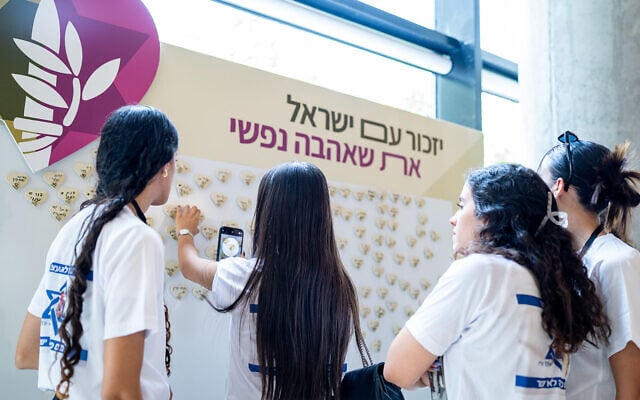
“The association helped me understand that I’m not alone,” Kaye added. “If in the middle of the night I suddenly feel sad, I can call one of the grieving partners — there is always someone who is going through the exact same thing I am.”
“All my best friends from outside the association and my family will never be able to understand me like they do,” she added.
Beyond its emotional support, GFIDF advocates for limited but meaningful forms of recognition, such as including unmarried partners in formal casualty notifications, ensuring they receive time off during shivas and memorials, and working with the IDF to integrate them into remembrance practices.
While the organization does not explicitly seek financial benefits on par with widows or the immediate families of fallen soldiers, its efforts aim to ensure that the grief of unmarried partners is acknowledged and supported.
Thanks in large part to GFIDF’s advocacy, the National Insurance Institute has begun providing support to those who were engaged to victims of terrorism or war since Hamas’s October 7 onslaught. Benefits include a monthly stipend of NIS 10,525 ($3,090) for five years — the same amount that widows receive — a one-time grant of NIS 6,040 ($1,770), and access to free psychological treatment.
Another intrinsic aspect of their work is raising public awareness surrounding the experiences of grieving partners, like stressing that losing a fiancé a week before the wedding is no less devastating than losing a spouse a week after.
A study by GFIDF professional adviser Ofri Bar Nadav, who researches grief at the University of Haifa, found that the lack of societal recognition for unmarried bereaved partners often makes the grieving process more complicated and challenging compared with married partners.
Heimowitz-Richter recalled cases where bereaved partners were told during shivas that they were “lucky” because they had not yet married or had children.
“These words are hurtful and violent,” she explained. “People say these things thinking it helps, but it doesn’t help,” instead only exacerbating the situation.
On Tuesday, in recognition of the group’s decades of support for nearly 900 grieving partners, Heimowitz-Richter was awarded the Israeli Presidential Medal of Honor, the highest civilian medal given by the president, which recognizes individuals who have made exceptional contributions to the State of Israel or to humanity. She and GFIDF have also been named winners of the Zusman-Joint Distribution Committee Prize, Israel’s most significant recognition for innovative social work, awarded to individuals and organizations contributing to improving social services.
For decades, unmarried partners of fallen soldiers in Israel had no institutional support and were left to grieve in silence. That began to change in 1998, when Heimowitz-Richter and her mother Phyllis Heimowitz founded GFIDF.
Their determination was born from devastating personal loss. In 1997, Phyllis Heimowitz’s daughter Michal lost her fiancé, Lt. Avi Buk, a commander in the Nahal Brigade, during an IDF operation in Lebanon.
The couple had already decided to marry, with Michal even shopping for wedding dresses days before his death.
“The week that he died, Buk was supposed to return from Lebanon for their engagement party,” Heimowitz-Richter recalled.
Michal’s grief was overwhelming. “She turned into a different person,” Heimowitz-Richter said. “She was in a state of endless pain.”
Soon after, a love letter Buk had written before his death arrived in the mail. “It was about how much he was looking forward to their lives together,” she said. “There is no doubt in my mind that Michal was his last thought before he died.”
There is no doubt in my mind that Michal was his last thought before he died.
The letter did little to ease Michal’s anguish. At one point, she could barely speak, whispering only: “Save me, I’m not capable of saving myself.”
When the family sought help from the Defense Ministry, they were told that because Michal and Buk were not married, she was not entitled to any support.
“My mother and I felt there was a debt to each fallen soldier to take care of his partner, because that’s what they would have wanted,” Heimowitz-Richter explained. Yet every attempt to push for change was met with refusal.
However, they persevered. Phyllis, who was an English teacher for senior IDF officers at the time, eventually secured a meeting with Shmuel Eyal, then-head of the army’s Personnel Directorate.
“At the end of the meeting, he said, ‘I understand,’” Heimowitz-Richter recalled. While the IDF itself could not directly support bereaved partners, Eyal offered a solution: “If you start an association, we will give you the money to take care of these partners.”
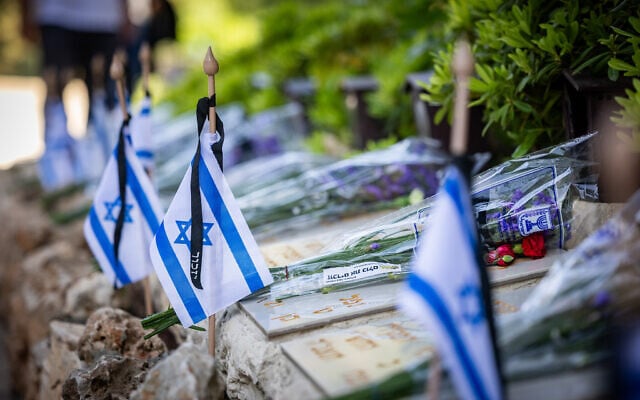
From that moment, GFIDF was born. Today, the association remains largely funded by the Defense Ministry, though a surge in new members since October 7 has forced it to rely increasingly on public donations.
“October 7 changed everything — we’re in a different world,” Heimowitz-Richter said.
Since that dark day, GFIDF has added 371 grieving partners to its rolls. While most are newly bereaved, nearly 50 of them lost loved ones in earlier conflicts — some dating back to the Yom Kippur War — and only recently discovered the group as it has gained prominence.
As the number of fallen soldiers has grown, GFIDF set up a dedicated team to identify whether each soldier left behind a partner. When one is found, the association steps in within days of the loss, surrounding the bereaved partner and their family with mentors and mental health professionals to guide them through the grieving process.
“Until the war, about 90 percent of our budget came from the Defense Ministry, and we hardly needed to fundraise,” Heimowitz-Richter said, noting that the association viewed government support as something that should be given as a matter of principle. But even with the ministry increasing its contribution, the funding still falls short of covering care for the rapidly growing number of bereaved partners.
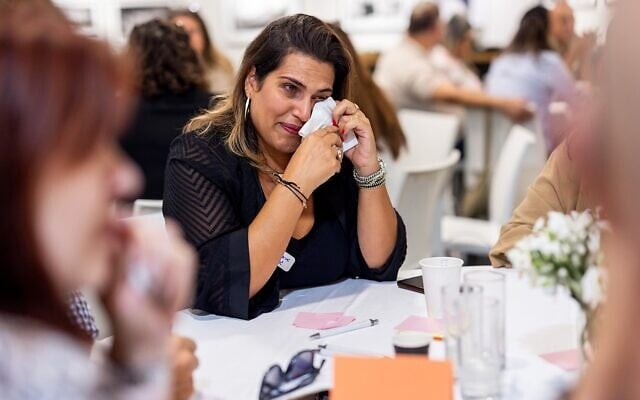
After more than a year of relying on GFIDF’s support, Kaye recently decided to give back, organizing a second-hand clothes sale in Avitan’s memory to raise funds for the group.
“I hope that we’re able to organize more events like this,” she said.
Kaye hopes to give back to the association in other ways, too.
“Hopefully, I will be able to mentor [future grieving partners], though I hope there won’t be who to mentor after this [war],” she said. “The association gave me so much, so the minimum I can do is give whatever I can back.”
Kaye has also devoted herself to keeping Avitan’s memory alive, maintaining a close relationship with his family — a connection she considers precious.
“Unfortunately, it can’t be taken for granted,” she explained. “There are families of fallen soldiers that aren’t in contact with the boyfriend or girlfriend.”

Together with Avitan’s mother, Kaye carries out daily acts in his memory. Recently, they raised funds to donate an ambulance to Israeli first responders in Avitan’s name.
“They took his life, but his mother and I will do everything in our power to save other lives,” she said.
Kaye and Avitan’s family also created a memorial Instagram page, ensuring his legacy continues to touch others.
She reflected on how she wanted others to remember the boyfriend she had hoped to spend the rest of her life with.
“It didn’t matter what, he always had a good word to say,” Kaye said. “He was always a straight arrow.”


